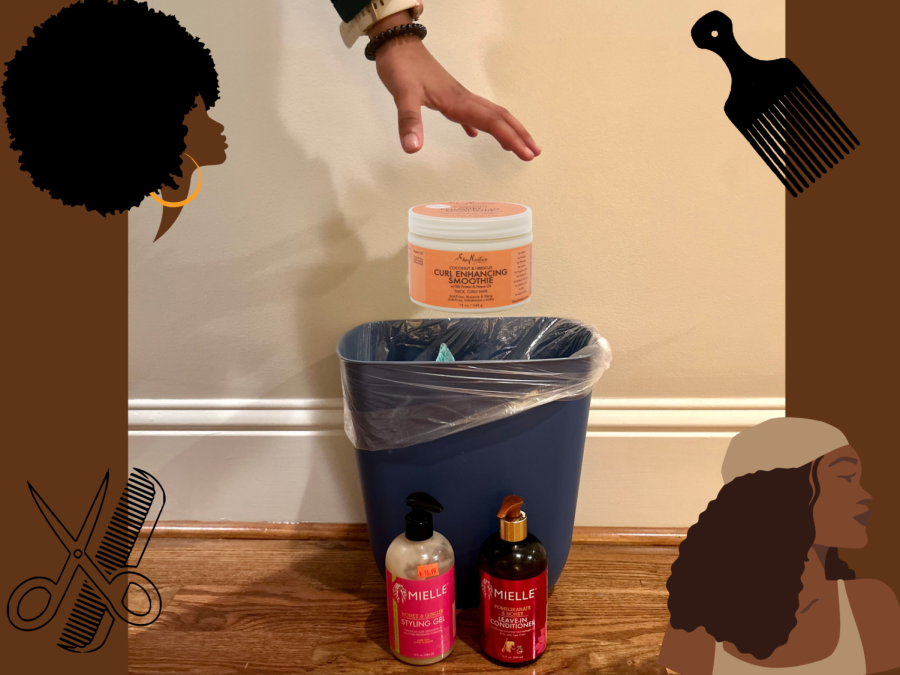The harm in exploiting Black-owned hair products
Over the years, companies such as Procter & Gamble have bought Black-owned brands to make a profit off of hair products designed for textured hair. With this deal comes a change in the product formula in an effort to cater to straight hair textures, so that a higher amount of the population buys the product. However, this limits the selection of hair products that the Black community can choose from to feed their hair.
January 20, 2023
A majority of people have heard someone say that every human holds unique attributes, similar to snowflakes; the same concept applies to hair. A plethora of hair textures, porosities and lengths exist, making every individual’s hair significantly different. These differences inevitably come with the responsibility to correctly maintain it, depending on the hair type. However, the endless list of hair types makes it impossible for everyone to use the same products and execute identical hair routines. Due to this obstacle, Black women with curly, kinky or coarse hair become angered when white companies buy products and change the formula to match their fine, straight and greasy hair in order to gain a greater consumer base. Especially considering the historical consequences of purging these resources, the purchase of these Black-owned products can hold negative effects, as it severely limits the approach that curly girls take on their hair.
“It’s always been really hard for me to find hair products to match my hair. Now it’s a bit easier because I know what I’m looking for because at first, I was kind of just using what I could based on price. When companies buy black owned hair lines, it really speaks to me because I feel that Black-owned companies should really work to covet their products because we already don’t have a lot and it makes me sad to know that we have products made for black people, and for our hair type but we’re just selling out so easily for wealth,” magnet senior and former Chant member Ren Lloyd said.
Dating back to when Madam C.J. Walker made her fortune off of selling her homemade hair products, Black women always struggled with finding the appropriate hair products for them. Because of experimentation, along with trial and error with certain brands, hair products dominate among Black consumers. This later prompted known companies run by white people to team up and buy out lesser-known Black hair care companies to receive a profit. While the founder of the product likely sees it as a business opportunity, the long-term deal robs the brand of the culture and effectiveness originally associated with it.
According to the owner of Mielle, P&G Beauty, the company that recently bought them out, will not change their formula. However, several consumers do not believe them after Shea Moisture– a Black-owned hair care brand– whitewashed their products designed for Black women’s hair. Shea Moisture started with an entrepreneur who created and sold homemade products in Sierra Leone, and the company ended up stripping Shea Moisture of its culture and worth.
Additionally, products made for ethnic hair, including Mielle continue to receive clout from influencers in the media. TikTok star Alix Earle continuously promotes Mielle’s Rosemary Mint Scalp & Hair Oil, opening up the door to purchases from individuals who do not possess ethnic hair. While a rule does not exist stating that only people with textured hair can buy these products, the brand did not design the product for them, but for people with curly and kinky hair.
“By now you know that there are not a lot of products on the market for us. If you go into the store, you have to march to the ethnic hair section, and you notice that this section is significantly smaller than all of the other sections. Because of supply and demand the Mielle oil has become a lot more inaccessible to communities who need it. It is important to be more knowledgeable about suitable products and to not blindly follow TikTok trends,” influencer Ronelle Tshiela said.








Ava • Aug 10, 2024 at 4:15 PM
I bought The Mane Choice because it was black owned. I really liked it and continued to use it. When it changed ownership, I switched to Mielle. By the time I was on my second jar of Mielle the product had changed and was disappointing. I’m still trying to finish it out, but I won’t buy more. Black women get these companies to a certain point then they invariably seem to sell out and also abandon the small black companies that helped get them there. We are viewed as no more than a cash source for the non-black cosmetic companies. I will continue to buy from fully black owned companies.